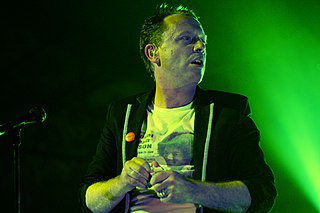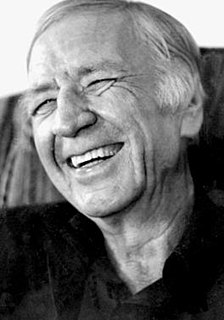A Quote by Gilbert K. Chesterton
Science boasts of the distance of its stars; of the terrific remoteness of the things of which it has to speak. But poetry and religion always insist upon the proximity, the almost menacing closeness of the things with which they are concerned. Always the Kingdom of Heaven is "At Hand."
Related Quotes
The Church even now is the kingdom of Christ and the kingdom of heaven. Accordingly, even now His saints reign with Him, though otherwise than as they shall reign hereafter; and yet, though the tares grow in the Church along with the wheat, they do not reign with Him. For they reign with Him who do what the apostle says, 'If you are risen with Christ, mind the things which are above, where Christ sits at the right hand of God. Seek those things which are above, not the things which are on the earth'.
Yet things are knowable! They are knowable, because, being from one, things correspond. There is a scale: and the correspondence of heaven to earth, of matter to mind, of the part to the whole, is our guide. As there is a science of stars, called astronomy; and science of quantities, called mathematics; a science of qualities, called chemistry; so there is a science of sciences,--I call it Dialectic,--which is the Intellect discriminating the false and the true.
Fear is the parent of cruelty, and therefore it is no wonder if cruelty and religion have gone hand-in-hand. It is because fear is at the basis of those two things. In this world we can now begin a little to understand things, and a little to master them by the help of science, which has forced its way step by step against the Christian religion, against the churches, and against the opposition of all the old precepts.
This [the opening of the Vatican City radio station built by Marconi earlier in 1931] was a new demonstration of the harmony between science and religion that each fresh conquest of science ever more luminously confirms, so that one may say that those who speak of the incompatibility of science and religion either make science say that which it never said or make religion say that which it never taught.
The whole point of science is that most of it is uncertain. That's why science is exciting--because we don't know. Science is all about things we don't understand. The public, of course, imagines science is just a set of facts. But it's not. Science is a process of exploring, which is always partial. We explore, and we find out things that we understand. We find out things we thought we understood were wrong. That's how it makes progress.
I hold all knowledge that is concerned with things that actually exist - all that is commonly called Science - to be of very slight value compared to the knowledge which, like philosophy and mathematics, is concerned with ideal and eternal objects, and is freed from this miserable world which God has made.
He meant the Kingdom was over, the Kingdom of Heaven, it was all finished. We shouldn't live as if it mattered more than this life in this world, because where we are is always the most important place.... We have to be all those difficult things like cheerful and kind and curious and patient, and we've got to study and think and work hard, all of us, in all our different worlds, and then we'll build... The Republic of Heaven.
Dad always said that he had enough trouble sorting the fiction out of so-called facts, without reading fiction. He always said that science was already too muddled without trying to make it jibe with religion. He said those things, but he also said that science itself could be a religion, that a broad mind was always in danger of becoming narrow.
Science is like society and trade, in resting at bottom upon a basis of faith. There are some things here, too, that we can not prove, otherwise there would be nothing we can prove. Science is busy with the hither-end of things, not the thither-end. It is a mistake to contrast religion and science in this respect, and to think of religion as taking everything for granted, and science as doing only clean work, and having all the loose ends gathered up and tucked in. We never reach the roots of things in science more than in religion.
There are certain things in which one is unable to believe for the simple reason that he never ceases to feel them. Things of this sort - things which are always inside of us and in fact are us and which consequently will not be pushed off or away where we can begin thinking about them - are no longer things; they, and the us which they are, equals A Verb; an IS.
Science without religion is dangerous because it necessarily entails a mechanization of humanity and consequent loss of individual autonomy and spirituality. On the other hand, religion without science is powerless because it lacks an effective means through which to actualize the ultimate reality. Science and religion must work together harmoniously.





































